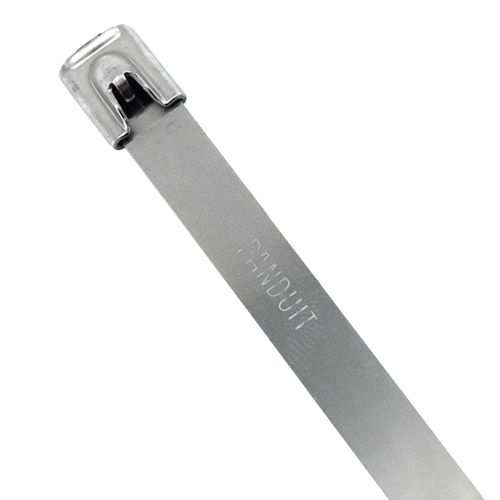Metal cable ties are renowned for their strength and reliability, making them essential for heavy-duty and demanding applications. Crafted from stainless steel or other alloys, they perform exceptionally well in extreme environments, offering durability and the ability to withstand harsh conditions.
However, one crucial factor in their long-term performance is their resistance to corrosion. Understanding how corrosion affects metal cable ties and how to mitigate it ensures these ties remain effective and durable in various applications.
Why Use Metal Ties
Metal cable ties are ideal for applications requiring high tensile strength, resistance to extreme temperatures, and long-term reliability. These features make them suitable for use in industries like construction, automotive, aerospace, and marine.
Key Advantages of Metal Ties
Metal cable ties provide significantly higher tensile strength than nylon alternatives, allowing them to secure heavy loads, industrial equipment, and large bundles of cables. They maintain their structural integrity in high-temperature environments, such as engine compartments or industrial manufacturing facilities.
Their ability to resist UV exposure, moisture, and weather conditions makes them ideal for outdoor applications, ensuring they do not degrade over time. Unlike their nylon counterparts, metal cable ties are built for longevity, retaining their effectiveness in challenging conditions.
Corrosion: A Critical Factor
Corrosion is the chemical or electrochemical reaction of metal with its environment, leading to degradation. For metal cable ties, corrosion can compromise their strength, reliability, and safety, particularly in harsh or high-risk environments.
Types of Corrosion
Galvanic corrosion occurs when two dissimilar metals come into contact in the presence of an electrolyte, such as saltwater, causing the more reactive metal to corrode. Pitting corrosion is a localized form of corrosion that leads to small holes or pits, often triggered by high chloride environments like coastal regions.
Stress corrosion cracking combines mechanical stress and corrosive conditions, leading to cracks that can weaken the tie. Crevice corrosion occurs in confined spaces, such as beneath the tie, where oxygen is limited, creating an environment that accelerates degradation.
How to Prevent Corrosion in Metal Cable Ties
While corrosion is inevitable in metal to some degree, using the right materials and techniques can minimize its effects and extend the lifespan of cable ties.
Choosing the Right Material
Stainless steel is the most commonly used material for metal cable ties, with different grades offering varying levels of corrosion resistance.
304 stainless steel is suitable for most general applications, providing strong resistance to corrosion in typical environments. However, it may struggle in highly corrosive conditions, such as marine or industrial chemical settings.
316 stainless steel contains molybdenum, offering superior resistance to chlorides and aggressive chemicals, making it the ideal choice for environments like coastal areas, chemical plants, or underwater applications.
Surface Treatments
Metal cable ties can undergo additional treatments to improve their resistance to corrosion. Passivation removes impurities and enhances the natural protective layer of stainless steel. Protective coatings, such as polymer or epoxy finishes, add an extra barrier to resist corrosive elements.
Installation Best Practices
Proper installation plays a critical role in preventing corrosion. Avoid overtightening, which can create stress points and increase the risk of cracking. Ensure compatibility between the cable tie and the materials it contacts to reduce the likelihood of galvanic corrosion. Clean the installation area to remove dirt, moisture, or corrosive elements that may accelerate degradation.
Applications Where Corrosion Resistance Is Essential

Metal cable ties are used across various industries, but some environments demand exceptional corrosion resistance due to their unique challenges.
Marine and Coastal Applications
Saltwater and high humidity levels create conditions that rapidly corrode metal. Metal cable ties with enhanced resistance, such as those made from 316 stainless steel, are ideal for securing cables, pipes, and equipment in these environments.
Chemical and Industrial Plants
In chemical processing facilities, exposure to aggressive substances can quickly degrade metal. Corrosion-resistant cable ties are necessary to ensure safety and functionality in such settings.
Automotive and Aerospace
Vehicles and aircraft often face a combination of high temperatures, salt, and moisture, making corrosion resistance a critical factor for cable ties used in securing wiring, hoses, or structural components.
Construction and Infrastructure
In outdoor construction, where exposure to weather elements is inevitable, corrosion-resistant ties ensure long-lasting performance in securing scaffolding, fencing, or electrical components.
Importance of Corrosion Resistance for Safety
Weakened ties in construction may fail to secure scaffolding or equipment, significantly increasing the risk of accidents. Corroded ties in marine environments can compromise underwater equipment, potentially causing functional failures or loss. The failure of ties in chemical plants, especially in high-pressure or high-stress settings, can result in leaks or severe equipment damage.
Wrapping Up
Metal cable ties are invaluable tools for securing, bundling, and organizing in high-demand environments. Their strength, temperature resistance, and longevity make them an excellent choice for industries that require reliable performance. However, understanding and mitigating the risks of corrosion are essential to ensure these ties deliver on their promise of durability.
Choosing the right material, such as 316 stainless steel, and following best practices for installation and maintenance can significantly reduce the impact of corrosion. Whether in marine, automotive, or industrial settings, corrosion-resistant metal cable ties ensure safety, efficiency, and long-term reliability.
For more insights and tips on cable ties and other related products, explore cabletiesunlimited.com and follow us on our social media communities on Facebook and Instagram!

